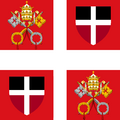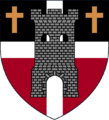Shield of Joanus: Difference between revisions
Tag: 2017 source edit |
Tag: 2017 source edit |
||
| Line 45: | Line 45: | ||
===Shield of Joanus in heraldry=== | ===Shield of Joanus in heraldry=== | ||
<gallery> | <gallery> | ||
File:Amarre_Coat_of_Arms.png|[[Coat of Arms of | File:Amarre_Coat_of_Arms.png|[[Coat of Arms of Amarre]] | ||
File:Army of the Air.png|Insiginia of the [[Army of the Air]] | File:Army of the Air.png|Insiginia of the [[Army of the Air]] | ||
File:Army_Procurement_Command_Yonderre.png|Insignia of the [[Army Procurement Command (Yonderre)|Army Procurement Command]] | File:Army_Procurement_Command_Yonderre.png|Insignia of the [[Army Procurement Command (Yonderre)|Army Procurement Command]] | ||
Latest revision as of 07:51, 26 September 2024
| Shield of Joanus | |
|---|---|
 Shield of Joanus | |
| Versions | |
 Crowned Shield of Joanus | |
| Armiger | Auguste IV de Somua, Grand Duke of Yonderre (with crown) House de Martigueux The Serene Grand Duchy Yonderre |
| Adopted | 1494 |
| Blazon | A shield quartered by a cross argent, first and second quarters sable; third and fourth quarters gules |
| Order(s) | Order of the Shield |
The Shield of Joanus, known in Burgoignesc as the Escut Joanus and in Gothic as the Joanusschild, is the Coat of Arms of the Serene Grand Duchy Yonderre and one of its most recognizable symbols.
Historically the coat of arms used by Joanus de Martigueux during the Conquest of Joanusterra, the Shield came to be the first symbol of the nascent crusader state Joanusterra with the Treaty for the guarantee of Joanus' Land signed between de Martigueux and Pope Alexander VI in 1494, which established Joanusterra as an independent realm. Falco I Sentinelleau, the first Grand Duke of Yonderre, cemented the Shield's status as national symbol with its adoption as part of the Flag of Yonderre in 1574. With the formation of the Grand Ducal Army in 1644 and their adoption of the Shield, the Shield of Joanus further became the official symbol of Yonderian power by virtue of military might.
Colours
The colours of the Shield of Joanus are black, white and red (sable, argent and gules in heraldic terms). The exact colours were defined by ducal decree in 1975 as "black as night, white as snow and madder red".
The exact reason for these colours remain unknown; while de Martigueux's colours are depicted as such in fifteenth century manuscripts and indeed in subsequent heraldry listings, the colours are neither traditional to the de Martigueux family nor their native Estia prior to Joanus' adoption of the colours. Conversely, black, white and red were very common colours in East Gothic heraldry and remain colours associated with Gothica in general and the East Goths in particular. It has been suggested by some historians that the Shield of Joanus may have been taken as a trophy by de Martigueux at the Battle of Willersthal in 1458, the first major engagement between de Martigueux's crusaders and the East Goths, while most historians consider this version of events speculative at best.
Banner and Shield Law
Under Yonderian law, it is forbidden to deface the Yonderian flag or Shield of Joanus or to use either in a disrespectful way. Anyone who breaks these regulations may be fined for disgracing the symbols.
Gallery
Shield of Joanus in flags
-
Flag of the Yonderian Kestrel Isles
-
Standard of the Yonderian Guard
Shield of Joanus in heraldry
-
Insiginia of the Army of the Air
-
Insignia of the Army Procurement Command
-
Insignia of the Marine Yonderre
-
Insignia of the Yonderian Chaplain Corps
Shield of Joanus in sports
-
Logo of Artillerie FC (Ligue Yonderre)
-
Crest worn by the Yonderre national football team










